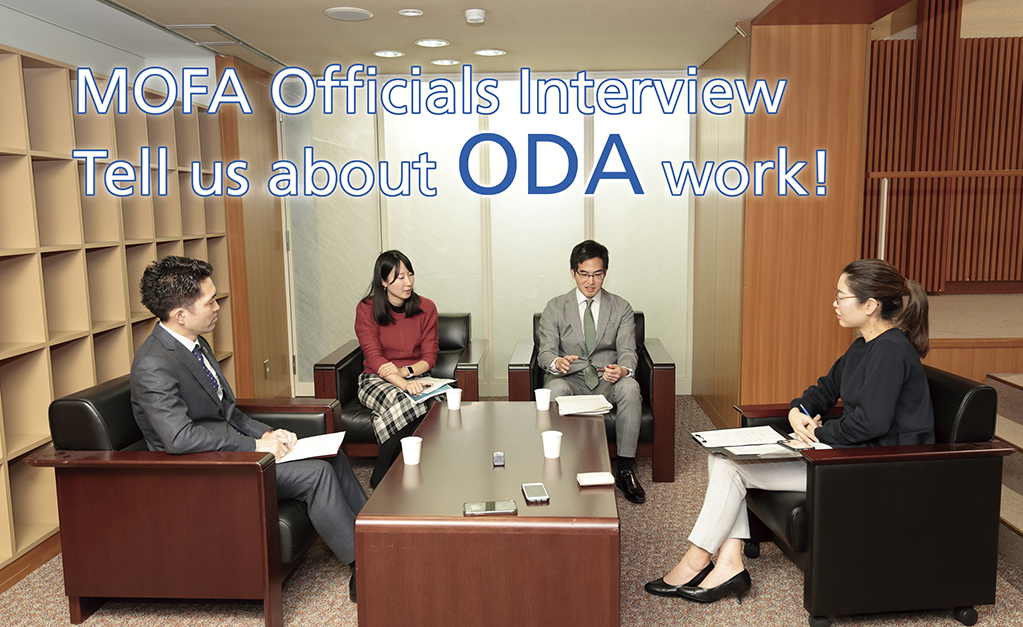
The Ministry of Foreign Affairs (MOFA) has established Embassies in 195 countries around the world as the front line of diplomacy. They serve to conduct negotiations and communications with partner governments, collect and analyze political, economic, and other information, and conduct public diplomacy and cultural activities to promote a proper understanding of Japan. In developing countries, another important role of the Embassies is to work on development cooperation through Official Development Assistance (ODA). This section presents interviews with some MOFA officials who have experience working at Japanese Embassies abroad.
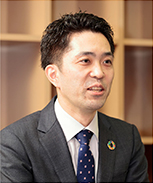
AOYAMA Daisuke, Assistant Director
After working at the Embassy of Japan in Mongolia, Mr. Aoyama worked on TICAD IV and the Hokkaido Toyako Summit. He is currently in charge of SDGs-related work at the Global Issues Cooperation Division, International Cooperation Bureau.

Host: OKADA Yuki, Deputy Director Development Assistance Policy Planning Division
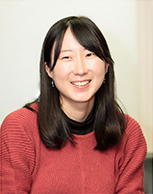
NOGUCHI Ayumi, Deputy Director
While working at the Embassy of Japan in Senegal, Ms. Noguchi also covered the affairs of the Embassy of Japan in Guinea-Bissau. Currently, she is in charge of tasks related to ODA budget at the Aid Policy and Management Division, International Cooperation Bureau.
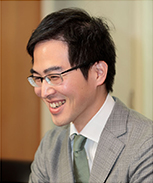
INABA Daiki, Assistant Director
After working at the Embassy of Japan in Brazil and the Embassy of Japan in Angola, Mr. Inaba was engaged in support measures against COVID-19 at the Office of the Director of the Global Health Strategy Division, International Cooperation Bureau. He currently deals the bilateral relations with Angola and Mozambique at the Second Africa Division, African Affairs Department, Middle Eastern and African Affairs Bureau.
Okada: Please tell us about your experience in the development cooperation work at the Embassy: how Japan’s assistance brings benefits to partner countries and if there are any rewarding or challenging aspects.
Aoyama: In Mongolia, Grant Assistance for Grass-Roots Human Security Projects Note 1 is actively conducted in repairing aging facilities of schools, nurseries, etc., across the country. Many people think of Japan’s “Grass-Roots Grant Aid” when it comes to community-based support. This made me realize, when working at the Embassy, that Japan’s development cooperation had led to building a great deal of trust in Japan among the people of Mongolia. I cannot deny that on many occasions, I felt that the people of Japan and Mongolia had different characteristics and behavioral patterns unique to each nation. However, in any part of the vast country, I heard words of gratitude such as “Thank you” and “My child attends a school supported by Japan.” I could feel first hand that the presence of Japan was widely recognized.
I also experienced a case in which Japanese assistance led to the strengthening of bilateral relations over the years. In 2019, then Prime Minister of Mongolia Khurelsukh, who came to Japan to attend the Ceremony of the Enthronement of His Majesty the Emperor at the Seiden (State Hall), expressed his aspiration: “I would like to have your support in finding my host family in Aomori Prefecture, who warmly welcomed me when I came to Japan for JICA training in the 1990s. I would like to invite them to Mongolia as I promised during my homestay.” Without knowing even their names, I managed to find the host family by searching the National Diet Library for any clues from that period and by asking the press. The invitation was fulfilled in the summer of 2022, and Mr. Khurelsukh, who had become the President of Mongolia, rejoiced at the reunion with his host family in Mongolia. I realized that Japan’s development cooperation connects people in various places, leading to the building of better relationships between countries.
Noguchi: Guinea-Bissau, Note 2 the country I covered from the Embassy of Japan in Senegal, was politically unstable, with frequently-attempted coups d’état at the changes of government. Under such circumstances, there was a growing momentum to hold legislative elections in order to build a stable nation. However, Guinea-Bissau did not have the sufficient know-how to hold legislative elections as it had little experience in the field. Driven by the desire to realize legislative elections in the country, we started considering what kind of assistance Japan could provide, and decided to support the election through collaborating with the United Nations Development Programme (UNDP). The elections can be an occasion where the struggles for leadership among influential figures become apparent. This election was no exception, and was postponed for various reasons. It was finally completed successfully with the support of various countries, including Japan. Through this experience, I became deeply aware of the significance and difficulties for democracy to take root. When I saw the Japanese flag on the election posters alongside those of other supporting countries from the EU and Africa upon the successful election, I was pleased with the fact that Japan could support the country’s significant reform in its own way.
Inaba: In Angola, where I previously worked, I observed numerous countries engaging in development cooperation, including emerging countries. Unfortunately, in certain cases, a substantial amount of financial aid was provided without sufficient consideration of the sustainability of the recipient country, nor did it align with international rules and standards. I firmly believe that one of the characteristics of Japanese assistance lies in its ability to integrate various strategies while striving to contribute to the long-term development of the recipient country. Specifically, Japan provides support for the construction of basic infrastructure facilities through grant aid, alongside technical cooperation in the form of human resources development and vocational training to ensure the proper maintenance and management of these facilities. By adopting this approach, the facilities can effectively support the sustainable growth of the country.
Japan also partners with Brazil to engage in triangular cooperation Note 3 in Angola, which shares the official language of Portuguese. During my tenure at the Embassy, we provided vocational training for the people of Angola, by inviting Brazilian experts as lecturers. These experts have acquired knowledge in industrial human resources development through the Brazilian National Service for Industrial Training (SENAI), which has received significant Japanese assistance primarily through JICA’s technical cooperation over the years. Japan continues to actively promote triangular cooperation for human resources development in Angola, with a current focus on automobile maintenance. This form of development cooperation becomes possible when Japan’s assistance to Brazil proves fruitful and gains the trust of the recipient country, allowing it to pass on its experience to other developing countries. People of Angola who have undergone training through Japanese assistance deeply appreciate the support, as it enables them to secure jobs with the skills acquired through vocational training, leading to more stable life. I found immense satisfaction in being part of this enduring and uniquely Japanese contribution that addresses the specific needs of our partner country.
Okada: Please tell us about your current development cooperation work at the MOFA Headquarters: if there are any rewarding or challenging aspects particular to working at the Headquarters, and how you utilize your experience of working at Embassies.
Noguchi: Currently, I am in charge of planning how to secure ODA budget. Without a budget, assistance cannot be provided on the ground. Therefore, I believe that my current role is to connect the field where development cooperation is implemented with the Japanese politics and the citizens. In order to get a budget approved, we should be able to clearly explain to the public that Japan’s assistance contributes to the development of the recipient countries, and ultimately to Japan’s national interest; how ODA is effectively implemented in cooperation with Japanese companies and civil society; how ODA implementation ultimately meets with Japan’s national interest; and how important it is for Japan to utilize ODA to solve global issues, such as climate change and infectious diseases, that cannot be solved by a single nation. I am working hard, questioning myself and learning every day, to be able to explain the significance of ODA to the public and to realize Japan’s development cooperation.
Aoyama: In our work at the Ministry, it is very important to determine how to prioritize the numerous issues and countries that require assistance. Based on the results of the dialogues with partner countries and needs analysis, the Embassies respectively send requests for cooperation to the Headquarters to address the challenges that each country faces. While all of these requests are important for respective countries, we need to prioritize the requests from multiple perspectives in order to make use of limited budget strategically and effectively in line with Japan’s foreign policy. We specifically ask ourselves whether the cooperation can demonstrate Japan’s comparative advantage, and whether we can follow up until the actual delivery of development effects. When working on the ground, we tend to focus only on the assistance needs, but I understand it is essential to consider how assistance that responds to those needs is important for Japanese diplomatic strategy from the project formation stage. In other words, it is necessary to have a deep understanding of both Japan’s broader diplomatic strategies and needs on the ground so as to accomplish better cooperation.
Inaba: What I have noticed while working at the Headquarters is the disparity in viewpoints between the Headquarters and Embassies overseas. Embassy officials often encounter challenges when coordinating with our partner countries on the frontline of diplomacy, which wouldn’t be as complicated if it were in Japan. For instance, obtaining a single document from the partner government may not be a straightforward process. During my time working abroad, simply requesting multiple times didn’t always yield results, and there were instances where I had to personally approach the responsible personnel’s desk to obtain a single document. However, my experience at the Embassies has proven valuable at the Headquarters, as it allows me to formulate realistic and effective diplomatic policies from the perspectives of our partner countries. This insight helps bridge the gap and better understand the needs and complexities faced by our diplomatic counterparts.
Okada: Lastly, please tell us about your thoughts on Japan’s future development cooperation.
Inaba: There are numerous partners around the world with whom we can collaborate. I firmly believe that cooperating with various actors, including other donors and international organizations, is essential to maximize the effect of our initiatives within a limited budget. This realization struck me during my time at the Office of the Director of the Global Health Strategy Division, where I worked to enhance vaccination rates in partner countries worldwide. While working in tandem with other actors, it is equally crucial for Japan to uphold its own mission and fulfill its commitments. I am of the opinion that seeking the realization of Japan’s policies, while fostering synergies with the efforts of other actors, is of paramount importance. By approaching challenges from broader perspectives and fostering collaborative solutions, we can effectively address existing issues and work toward a more sustainable and impactful approach.
Noguchi: In the dramatically changing current global situation, I think it is imperative to reaffirm the importance of ODA. The progress toward achieving the SDGs has been seriously challenged amid the spread of COVID-19 while natural disasters and conflicts are taking place around the world. The role of ODA is enormous in responding to such huge challenges. In order to achieve results effectively within a limited budget, “selection and concentration” are obviously important. On the other hand, without a sufficient budget, it will be difficult to continue assistance and cope with new challenges. Therefore, I believe that it is critical to put effort into increasing the budget, ensuring that we thoroughly explain the importance of ODA to Japanese citizens and obtain their consent on how we increase and use the ODA budget, and showing expected results for both Japan and the world.
Aoyama: I feel that other countries have high expectations for Japan. As the global situation changes rapidly, both business and ODA will require even greater speed. In order to meet the expectations placed on our country, I believe that it is important for various actors in Japan to get engaged in development cooperation and to bring an effective division of roles between the public and private sectors. This means, if the private sector can take the lead in tasks that stand as a business while the public sector takes charge of other areas, we should support creating such a framework that will greatly contribute to the partner countries’ growth in a more sustainable manner.
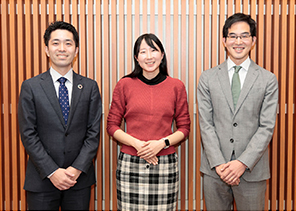
- Note 1: Grant aid that provides the necessary funds for relatively small-scale, grass-root level projects that directly contribute to community residents, based on the principle of human security and with the aim of promoting economic and social development in developing countries (the maximum grant limit is 10 million yen or less in principle). This program targets NGOs and local public entities.
- Note 2: Japan does not have an embassy building in Guinea-Bissau, but the Embassy of Japan in Senegal concurrently covers the operations in Guinea-Bissau.
- Note 3: See the glossary.
